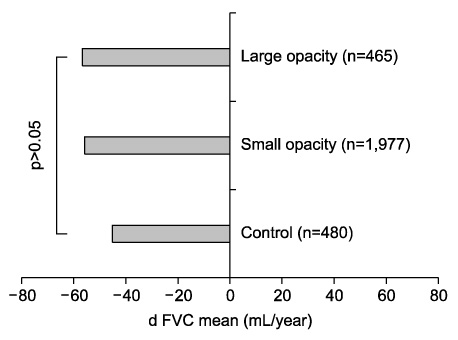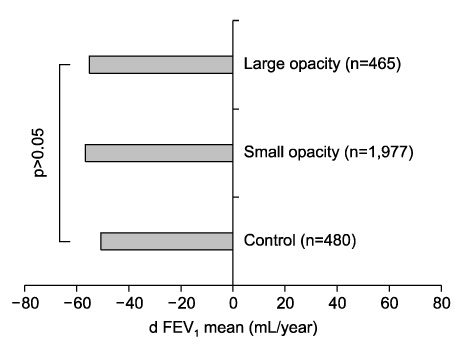Tuberc Respir Dis.
2011 Nov;71(5):341-348.
Annual Changes of Lung Function in Retired Workers Exposed to Inorganic Dusts
- Affiliations
-
- 1Occupational lung Diseases Institute, Korea Workers' Compensation & Welfare Service, Ansan, Korea. ljo9704@naver.com
- 2Department of Environmental Health, Yongin University, Yongin, Korea.
- 3Korea Occupational Medicial Institute, Uijeongbu, Korea.
Abstract
- BACKGROUND
The aim of this study was to investigate annual changes in pulmonary function in workers who were exposed to inorganic dust.
METHODS
The subjects were 2,922 male patients who had been diagnosed with pneumoconiosis more than twice during 6 years from 2005 to 2010.
RESULTS
Of the 2,922 cases, forced vital capacity (FVC) decreased by 54 mL in 1 year. In contrast, the annual change of forced expiratory volume in one second (FEV1) decreased by 56 mL.
CONCLUSION
This is the first study that has investigated the annual change in pulmonary function in workers exposed to inorganic dust. The results will help estimate the pulmonary condition of patients who are unable to perform a pulmonary function test due to age or a disorder.
Keyword
MeSH Terms
Figure
Reference
-
1. Kim HW, Yoo ST, Song SH, Joo JC. The effect of aging on the pulmonary function of the healthy adults. Korean J Anesthesiol. 1990. 23:1021–1026.2. Knudson RJ, Slatin RC, Lebowitz MD, Burrows B. The maximal expiratory flow-volume curve. Normal standards, variability, and effects of age. Am Rev Respir Dis. 1976. 113:587–600.3. Cotes JE. Cotes JE, editor. Lung function throughout life: determinants and reference values. Lung function: assessment and application in medicine. 1979. 4th ed. Oxford: Blackwell Scientific;329.4. Ministry of Environment. A study on health risk assessment based on biomarkers for environmental pollutants. 2002. Seoul: Seoul National University School of Public Health.5. Mannino DM, Reichert MM, Davis KJ. Lung function decline and outcomes in an adult population. Am J Respir Crit Care Med. 2006. 173:985–990.6. Hyatt RE, Kistin AD, Mahan TK. Respiratory disease in southern west Virginia coal miners. Am Rev Respir Dis. 1964. 89:387–401.7. Choi BS, Kim BW, Lim JC. A statistical system builds pueumoconiosis. A study report. 2006. Ansan: Occupational Lung Diseases Institute, Korea Workers Compensation & Welfare Service.8. Miller MR, Hankinson J, Brusasco V, Burgos F, Casaburi R, Coates A, et al. Standardisation of spirometry. Eur Respir J. 2005. 26:319–338.9. Miller MR, Crapo R, Hankinson J, Brusasco V, Burgos F, Casaburi R, et al. General considerations for lung function testing. Eur Respir J. 2005. 26:153–161.10. Sung HS, Yoon SJ, Lee TH, Kim DH, Whang JW, Park HK. Evaluation of pulmonary function by the method of spirometric computer. Korean J Intern Med. 1984. 27:1542–1549.11. Lee JM, Kim EJ, Kang MJ, Son JW, Lee SJ, Kim DG, et al. The influence of aging on pulmonary function tests in elderly Korean population. Tuberc Respir Dis. 2000. 49:752–759.12. Lee MC. Relationship between pulmonary function impairment by one-second forced expiratory volume and radiographic progression in pneumoconiosis. J Cathol Med Coll. 1980. 33:505–514.13. Manfreda J, Sidwall G, Maini K, West P, Cherniack RM. Respiratory abnormalities in employees of the hard rock mining industry. Am Rev Respir Dis. 1982. 126:629–634.14. Collins HP, Dick JA, Bennett JG, Pern PO, Rickards MA, Thomas DJ, et al. Irregularly shaped small shadows on chest radiographs, dust exposure, and lung function in coalworkers' pneumoconiosis. Br J Ind Med. 1988. 45:43–55.15. Prowse K, Allen MB, Bradbury SP. Respiratory symptoms and pulmonary impairment in male and female subjects with pottery workers' silicosis. Ann Occup Hyg. 1989. 33:375–385.16. Seixas NS, Robins TG, Attfield MD, Moulton LH. Exposure-response relationships for coal mine dust and obstructive lung disease following enactment of the Federal Coal Mine Health and Safety Act of 1969. Am J Ind Med. 1992. 21:715–734.17. Woolcock AJ, Colman MH, Blackburn CR. Factors affecting normal values for ventilatory lung function. Am Rev Respir Dis. 1972. 106:692–709.18. Higgins IT. Chronic respiratory disease in mining communities. Ann N Y Acad Sci. 1972. 200:197–210.19. Choi JK. Determinants of pulmonary function in pneumoconiosis. 2003. Seoul: Seoul National University;Doctoral thesis.20. Cochrane AL, Higgins IT. Pulmonary ventilatory functions of coalminers in various areas in relation to the x-ray category of pneumoconiosis. Br J Prev Soc Med. 1961. 15:1–11.21. Shford JR, Brown S, Morgan DC. The pulmonary ventilatory function of coal miners in the United Kingdom. Am Rev Respir Dis. 1968. 97:810–826.22. Seaton A, Lapp NL, Morgan WK. Relationship of pulmonary impairment in simple coal workers' pneumoconiosis to type of radiographic opacity. Br J Ind Med. 1972. 29:50–55.23. Morgan WK, Handelsman L, Kibelstis J, Lapp NL, Reger R. Ventilatory capacity and lung volumes of US coal miners. Arch Environ Health. 1974. 28:182–189.24. Chung CK, Yun IG. Screening of Respiratory Impairments in Anthracosis. Korean J Occup Environ Med. 1990. 2:93–104.25. Bates DV, Pham QT, Chau N, Pivoteau C, Dechoux J, Sadoul P. A longitudinal study of pulmonary function in coal miners in Lorraine, France. Am J Ind Med. 1985. 8:21–32.26. Bourgkard E, Bernadac P, Chau N, Bertrand JP, Teculescu D, Pham QT. Can the evolution to pneumoconiosis be suspected in coal miners? A longitudinal study. Am J Respir Crit Care Med. 1998. 158:504–509.27. Meijers JM, Swaen GM, Slangen JJ. Mortality of Dutch coal miners in relation to pneumoconiosis, chronic obstructive pulmonary disease, and lung function. Occup Environ Med. 1997. 54:708–713.28. Merchant JA, Taylor G, Hodous TK. Merchant J, editor. Coal workers' pneumoconiosis and exposure to other carbonaceous dusts. Occupational respiratory diseases. 1986. Washington DC: US Department of Health and Human Services, National Institute for Occupational Safety and Health;329–400.29. Kim HS, Kang HS. Effects of a pulmonary rehabilitation program for patients with chronic obstructive pulmonary disease. Clin Nurs Res. 2006. 12:43–53.30. Yoon SH, Na JO, Jegal YJ, Kim MW, Kim ES, Shim TS, et al. Development of the home-based pulmonary rehabilitation program for patients with chronic lung disease. Tuberc Respir Dis. 2002. 52:597–607.
- Full Text Links
- Actions
-
Cited
- CITED
-
- Close
- Share
- Similar articles
-
- Problems and Suggestions for Improvement in Epidemiological Study of Coal Workers' Pneumoconiosis in Korea
- Lung Function in Workers at Small Foundries
- Pneumoconiosis with Workers of Manufacturing Industry in Incheon
- Relation of Pulmonary Function Impairment and Coronary Artery Calcification by Multi-detector Computed Tomography in Group Exposed to Inorganic Dusts
- The Application of Impulse Oscillometry (IOS) in the Workers Who had been Exposed to Inorganic Dust Induced Early Airway Obstruction



